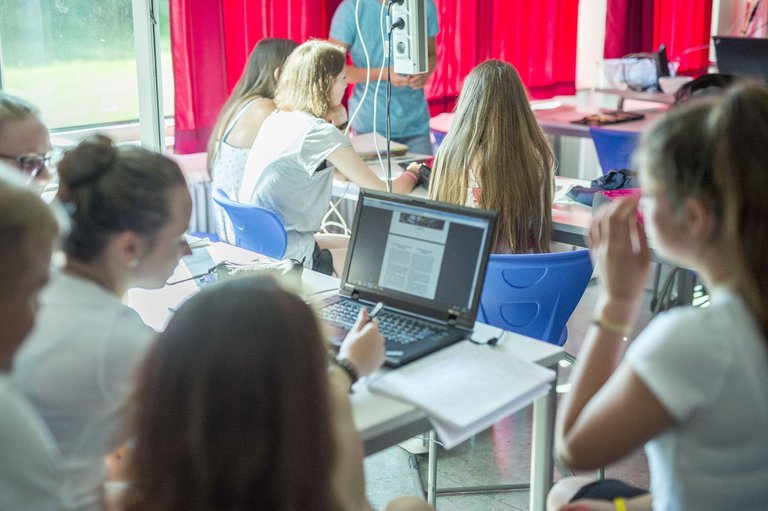Computer science concept at the Castle School
Prepare for the increasingly digitized world
We live in the information age, almost all processes of our daily lives are provided with information-processing, computer-aided technology modules. Germany's economic success in many areas is based on high-quality technical implementations and the use of IT infrastructures. Therefore, it seems more than sensible that children and young people are also prepared for this and the following age of an increasingly digitized world. Not the right use of media and consumption is an important part of school education, but also the computer science lessons that promote understanding in detail.
According to the Curriculum Baden-Württemberg

The state of Baden-Württemberg offers the following options by means of educational plans: In grade 7, computer science is a one-hour compulsory subject at all grammar schools. Afterwards, the children and young people can choose whether to turn to the profile subject IMP (Computer Science, Mathematics and Physics) with corresponding specialisations, or another profile subject, which does not include information technology content. In grade 10 you can then attend a preparatory course in computer science , which can then be continued in the course level as a basic or advanced subject until the Abitur and even a Abitur examination. Nevertheless, it is also possible to obtain a general university entrance qualification, although one only had the subject of computer science in grade 7.
In accordance with this circumstance, we have developed our own computer science concept at the Schloss-Schule, which, in addition to compulsory lessons, makes all students from grade 8 onwards an additional offer in the Department of Computer Science, which can then be elected annually up to and including grade 10 .
Own concept of the castle school
Computer science lessons in grade 8 can be divided into three large thematic blocks:
-
Data and Coding
In this area we deal with binary codes (conversion of binary numbers – decimal numbers, addition and subtraction), error-detecting codes (ISBN, EAN, check digits), error-correcting codes (parity bit, Hamming code, XOR – link).
-
Algorithms
In this area, the children and young people learn programming with the BOB3 board under learning supervision. For example, it is about understanding and applying the principle of programming, the meaning of programming syntax (loops, if – else – queries, switch – case, ...), how to control the robot LEDs (change flashing light and colors of the LEDs), how to make LEDs light up depending on conditions (e.B. true/false) and how to control and evaluate sensors (e.B. IR – sensor, Temperature sensor).
-
Computers and networks
In this area, one considers the construction and simulation of simple networks, the communication between computers (addressing, structure of IP4 and MAC addresses, packet orientation, protocols) as well as the client/server principle and the function of servers. The call of a website (structure of an Internet address, DNS server as a telephone book for the Internet) is practically played through and own simple websites are created.
In grade 9, these thematic blocks are expanded and supplemented...
... through the areas of "Information Society and Data Security" and "Data and Coding". Here, the students learn the Vigenère method and how to attack or crack this encryption method and what the security of encrypting data is based on. The problem of data loss and possibilities of data recovery are discussed and own strategies for avoiding data loss at home are developed. Through data compression methods, the students are clearly taught why they make sense and why this can lead to information and thus quality losses.
The overall concept is then rounded off in grade 10...
... through the topics "Algorithms" and "Computers and Networks". Here, the knowledge from grade 8 is refreshed and the logical operators important for computer science are introduced and explained. The effectiveness of algorithms is examined in practice and the theoretical basics and backgrounds of programming are further deepened.
Overall, our students have the opportunity to prepare themselves well for their later life and for the professional world in the field of computer science in order to be fit for a later study or training in one of the many modern training directions.